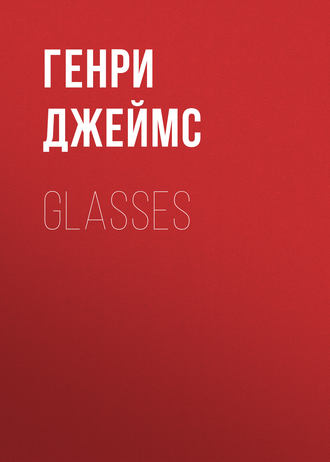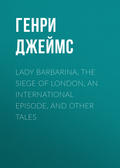
Генри Джеймс
Glasses
CHAPTER III
This conversation occurred the night before I went back to town. I settled on the morrow to take a late train, so that I had still my morning to spend at Folkestone, where during the greater part of it I was out with my mother. Every one in the place was as usual out with some one else, and even had I been free to go and take leave of her I should have been sure that Flora Saunt would not be at home. Just where she was I presently discovered: she was at the far end of the cliff, the point at which it overhangs the pretty view of Sandgate and Hythe. Her back, however, was turned to this attraction; it rested with the aid of her elbows, thrust slightly behind her so that her scanty little shoulders were raised toward her ears, on the high rail that inclosed the down. Two gentlemen stood before her whose faces we couldn’t see but who even as observed from the rear were visibly absorbed in the charming figure-piece submitted to them. I was freshly struck with the fact that this meagre and defective little person, with the cock of her hat and the flutter of her crape, with her eternal idleness, her eternal happiness, her absence of moods and mysteries and the pretty presentation of her feet, which especially now in the supported slope of her posture occupied with their imperceptibility so much of the foreground—I was reminded anew, I say, how our young lady dazzled by some art that the enumeration of her merits didn’t explain and that the mention of her lapses didn’t affect. Where she was amiss nothing counted, and where she was right everything did. I say she was wanting in mystery, but that after all was her secret. This happened to be my first chance of introducing her to my mother, who had not much left in life but the quiet look from under the hood of her chair at the things which, when she should have quitted those she loved, she could still trust to make the world good for them. I wondered an instant how much she might be moved to trust Flora Saunt, and then while the chair stood still and she waited I went over and asked the girl to come and speak to her. In this way I saw that if one of Flora’s attendants was the inevitable young Hammond Synge, master of ceremonies of her regular court, always offering the use of a telescope and accepting that of a cigar, the other was a personage I had not yet encountered, a small pale youth in showy knickerbockers, whose eyebrows and nose and the glued points of whose little moustache were extraordinarily uplifted and sustained. I remember taking him at first for a foreigner and for something of a pretender: I scarce know why unless because of the motive I felt in the stare he fixed on me when I asked Miss Saunt to come away. He struck me a little as a young man practising the social art of impertinence; but it didn’t matter, for Flora came away with alacrity, bringing all her prettiness and pleasure and gliding over the grass in that rustle of delicate mourning which made the endless variety of her garments, as a painter could take heed, strike one always as the same obscure elegance. She seated herself on the floor of my mother’s chair, a little too much on her right instep as I afterwards gathered, caressing her still hand, smiling up into her cold face, commending and approving her without a reserve and without a doubt. She told her immediately, as if it were something for her to hold on by, that she was soon to sit to me for a “likeness,” and these words gave me a chance to enquire if it would be the fate of the picture, should I finish it, to be presented to the young man in the knickerbockers. Her lips, at this, parted in a stare; her eyes darkened to the purple of one of the shadow-patches on the sea. She showed for the passing instant the face of some splendid tragic mask, and I remembered for the inconsequence of it what Mrs. Meldrum had said about her sight. I had derived from this lady a worrying impulse to catechise her, but that didn’t seem exactly kind; so I substituted another question, inquiring who the pretty young man in knickerbockers might happen to be.
“Oh a gentleman I met at Boulogne. He has come over to see me.” After a moment she added: “Lord Iffield.”
I had never heard of Lord Iffield, but her mention of his having been at Boulogne helped me to give him a niche. Mrs. Meldrum had incidentally thrown a certain light on the manners of Mrs. Floyd-Taylor, Flora’s recent hostess in that charming town, a lady who, it appeared, had a special vocation for helping rich young men to find a use for their leisure. She had always one or other in hand and had apparently on this occasion pointed her lesson at the rare creature on the opposite coast. I had a vague idea that Boulogne was not a resort of the world’s envied; at the same time there might very well have been a strong attraction there even for one of the darlings of fortune. I could perfectly understand in any case that such a darling should be drawn to Folkestone by Flora Saunt. But it was not in truth of these things I was thinking; what was uppermost in my mind was a matter which, though it had no sort of keeping, insisted just then on coming out.
“Is it true, Miss Saunt,” I suddenly demanded, “that you’re so unfortunate as to have had some warning about your beautiful eyes?”
I was startled by the effect of my words; the girl threw back her head, changing colour from brow to chin. “True? Who in the world says so?” I repented of my question in a flash; the way she met it made it seem cruel, and I felt my mother look at me in some surprise. I took care, in answer to Flora’s challenge, not to incriminate Mrs. Meldrum. I answered that the rumour had reached me only in the vaguest form and that if I had been moved to put it to the test my very real interest in her must be held responsible. Her blush died away, but a pair of still prettier tears glistened in its track. “If you ever hear such a thing said again you can say it’s a horrid lie!” I had brought on a commotion deeper than any I was prepared for; but it was explained in some degree by the next words she uttered: “I’m happy to say there’s nothing the matter with any part of me whatever, not the least little thing!” She spoke with her habitual complacency, with triumphant assurance; she smiled again, and I could see how she wished that she hadn’t so taken me up. She turned it off with a laugh. “I’ve good eyes, good teeth, a good digestion and a good temper. I’m sound of wind and limb!” Nothing could have been more characteristic than her blush and her tears, nothing less acceptable to her than to be thought not perfect in every particular. She couldn’t submit to the imputation of a flaw. I expressed my delight in what she told me, assuring her I should always do battle for her; and as if to rejoin her companions she got up from her place on my mother’s toes. The young men presented their backs to us; they were leaning on the rail of the cliff. Our incident had produced a certain awkwardness, and while I was thinking of what next to say she exclaimed irrelevantly: “Don’t you know? He’ll be Lord Considine.” At that moment the youth marked for this high destiny turned round, and she spoke to my mother. “I’ll introduce him to you—he’s awfully nice.” She beckoned and invited him with her parasol; the movement struck me as taking everything for granted. I had heard of Lord Considine and if I had not been able to place Lord Iffield it was because I didn’t know the name of his eldest son. The young man took no notice of Miss Saunt’s appeal; he only stared a moment and then on her repeating it quietly turned his back. She was an odd creature: she didn’t blush at this; she only said to my mother apologetically, but with the frankest sweetest amusement, “You don’t mind, do you? He’s a monster of shyness!” It was as if she were sorry for every one—for Lord Iffield, the victim of a complaint so painful, and for my mother, the subject of a certain slight. “I’m sure I don’t want him!” said my mother, but Flora added some promise of how she would handle him for his rudeness. She would clearly never explain anything by any failure of her own appeal. There rolled over me while she took leave of us and floated back to her friends a wave of superstitious dread. I seemed somehow to see her go forth to her fate, and yet what should fill out this orb of a high destiny if not such beauty and such joy? I had a dim idea that Lord Considine was a great proprietor, and though there mingled with it a faint impression that I shouldn’t like his son the result of the two images was a whimsical prayer that the girl mightn’t miss her possible fortune.
CHAPTER IV
One day in the course of the following June there was ushered into my studio a gentleman whom I had not yet seen but with whom I had been very briefly in correspondence. A letter from him had expressed to me some days before his regret on learning that my “splendid portrait” of Miss Flora Louisa Saunt, whose full name figured by her own wish in the catalogue of the exhibition of the Academy, had found a purchaser before the close of the private view. He took the liberty of inquiring whether I might have at his service some other memorial of the same lovely head, some preliminary sketch, some study for the picture. I had replied that I had indeed painted Miss Saunt more than once and that if he were interested in my work I should be happy to show him what I had done. Mr. Geoffrey Dawling, the person thus introduced to me, stumbled into my room with awkward movements and equivocal sounds—a long, lean, confused, confusing young man, with a bad complexion and large protrusive teeth. He bore in its most indelible pressure the postmark, as it were, of Oxford, and as soon as he opened his mouth I perceived, in addition to a remarkable revelation of gums, that the text of the queer communication matched the registered envelope. He was full of refinements and angles, of dreary and distinguished knowledge. Of his unconscious drollery his dress freely partook; it seemed, from the gold ring into which his red necktie was passed to the square toe-caps of his boots, to conform with a high sense of modernness to the fashion before the last. There were moments when his overdone urbanity, all suggestive stammers and interrogative quavers, made him scarcely intelligible; but I felt him to be a gentleman and I liked the honesty of his errand and the expression of his good green eyes.
As a worshipper at the shrine of beauty, however, he needed explaining, especially when I found he had no acquaintance with my brilliant model; had on the mere evidence of my picture taken, as he said, a tremendous fancy to her looks. I ought doubtless to have been humiliated by the simplicity of his judgment of them, a judgment for which the rendering was lost in the subject, quite leaving out the element of art. He was like the innocent reader for whom the story is “really true” and the author a negligible quantity. He had come to me only because he wanted to purchase, and I remember being so amused at his attitude, which I had never seen equally marked in a person of education, that I asked him why, for the sort of enjoyment he desired, it wouldn’t be more to the point to deal directly with the lady. He stared and blushed at this; the idea clearly alarmed him. He was an extraordinary case—personally so modest that I could see it had never occurred to him. He had fallen in love with a painted sign and seemed content just to dream of what it stood for. He was the young prince in the legend or the comedy who loses his heart to the miniature of the princess beyond seas. Until I knew him better this puzzled me much—the link was so missing between his sensibility and his type. He was of course bewildered by my sketches, which implied in the beholder some sense of intention and quality; but for one of them, a comparative failure, he ended by conceiving a preference so arbitrary and so lively that, taking no second look at the others, he expressed his wish to possess it and fell into the extremity of confusion over the question of price. I helped him over that stile, and he went off without having asked me a direct question about Miss Saunt, yet with his acquisition under his arm. His delicacy was such that he evidently considered his rights to be limited; he had acquired none at all in regard to the original of the picture. There were others—for I was curious about him—that I wanted him to feel I conceded: I should have been glad of his carrying away a sense of ground acquired for coming back. To ensure this I had probably only to invite him, and I perfectly recall the impulse that made me forbear. It operated suddenly from within while he hung about the door and in spite of the diffident appeal that blinked in his gentle grin. If he was smitten with Flora’s ghost what mightn’t be the direct force of the luminary that could cast such a shadow? This source of radiance, flooding my poor place, might very well happen to be present the next time he should turn up. The idea was sharp within me that there were relations and complications it was no mission of mine to bring about. If they were to develop they should develop in their very own sense.
Let me say at once that they did develop and that I perhaps after all had something to do with it. If Mr. Dawling had departed without a fresh appointment he was to reappear six months later under protection no less powerful than that of our young lady herself. I had seen her repeatedly for months: she had grown to regard my studio as the temple of her beauty. This miracle was recorded and celebrated there as nowhere else; in other places there was occasional reference to other subjects of remark. The degree of her presumption continued to be stupefying; there was nothing so extraordinary save the degree in which she never paid for it. She was kept innocent, that is she was kept safe, by her egotism, but she was helped also, though she had now put off her mourning, by the attitude of the lone orphan who had to be a law unto herself. It was as a lone orphan that she came and went, as a lone orphan that she was the centre of a crush. The neglect of the Hammond Synges gave relief to this character, and she made it worth their while to be, as every one said, too shocking. Lord Iffield had gone to India to shoot tigers, but he returned in time for the punctual private view: it was he who had snapped up, as Flora called it, the gem of the exhibition. My hope for the girl’s future had slipped ignominiously off his back, but after his purchase of the portrait I tried to cultivate a new faith. The girl’s own faith was wonderful. It couldn’t however be contagious: too great was the limit of her sense of what painters call values. Her colours were laid on like blankets on a cold night. How indeed could a person speak the truth who was always posturing and bragging? She was after all vulgar enough, and by the time I had mastered her profile and could almost with my eyes shut do it in a single line I was decidedly tired of its “purity,” which affected me at last as inane. One moved with her, moreover, among phenomena mismated and unrelated; nothing in her talk ever matched anything out of it. Lord Iffield was dying of love for her, but his family was leading him a life. His mother, horrid woman, had told some one that she would rather he should be swallowed by a tiger than marry a girl not absolutely one of themselves. He had given his young friend unmistakable signs, but was lying low, gaining time: it was in his father’s power to be, both in personal and in pecuniary ways, excessively nasty to him. His father wouldn’t last for ever—quite the contrary; and he knew how thoroughly, in spite of her youth, her beauty and the swarm of her admirers, some of them positively threatening in their passion, he could trust her to hold out. There were richer, cleverer men, there were greater personages too, but she liked her “little viscount” just as he was, and liked to think that, bullied and persecuted, he had her there so gratefully to rest upon. She came back to me with tale upon tale, and it all might be or mightn’t. I never met my pretty model in the world—she moved, it appeared, in exalted circles—and could only admire, in her wealth of illustration, the grandeur of her life and the freedom of her hand.
I had on the first opportunity spoken to her of Geoffrey Dawling, and she had listened to my story so far as she had the art of such patience, asking me indeed more questions about him than I could answer; then she had capped my anecdote with others much more striking, the disclosure of effects produced in the most extraordinary quarters: on people who had followed her into railway carriages; guards and porters even who had literally stuck there; others who had spoken to her in shops and hung about her house door; cabmen, upon her honour, in London, who, to gaze their fill at her, had found excuses to thrust their petrifaction through the very glasses of four-wheelers. She lost herself in these reminiscences, the moral of which was that poor Mr. Dawling was only one of a million. When therefore the next autumn she flourished into my studio with her odd companion at her heels her first care was to make clear to me that if he was now in servitude it wasn’t because she had run after him. Dawling explained with a hundred grins that when one wished very much to get anything one usually ended by doing so—a proposition which led me wholly to dissent and our young lady to asseverate that she hadn’t in the least wished to get Mr. Dawling. She mightn’t have wished to get him, but she wished to show him, and I seemed to read that if she could treat him as a trophy her affairs were rather at the ebb. True there always hung from her belt a promiscuous fringe of scalps. Much at any rate would have come and gone since our separation in July. She had spent four months abroad, where, on Swiss and Italian lakes, in German cities, in the French capital, many accidents might have happened.






